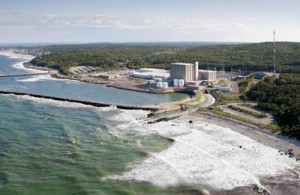
Courtesy: pilgrimpower.com
PLYMOUTH – The company that owns the Pilgrim Nuclear Power Station in Plymouth announced Tuesday that they will close the plant no later than June 1, 2019.
Entergy cites poor market conditions, reduced revenues and increased operational costs in its decision. The 43 year old plant needs millions of dollars in safety improvements.
Without those upgrades, the plant faced a potential shutdown from the federal government.
“The decision to close Pilgrim was incredibly difficult because of the effect on our employees and the communities in which they work and live,” said Leo Denault, Entergy’s chairman and chief executive officer.
Today’s news comes about a month after federal inspectors said they would increase oversight of the plant in the wake of a shutdown during a winter storm. That move downgraded the plant’s safety rating and put the facility in a category as one of the three worst performing plants in the country, along with two reactors in Arkansas.
The Nuclear Regulatory Commission said that Pilgrim could have prevented the January 27, 2015 problem involving safety relief valves at the plant by identifying, evaluating and correcting a condition that caused one of the valves to fail to operate correctly after a plant shutdown in 2013.
Cape and Islands State Senator Dan Wolf (D-Harwich), a longtime supporter of closing the plant, said he was pleased with Entergy’s decision.
“Now the focus is from when is the plant going to stop operating to how do we responsibly decommission it, following both the financing and safety of that,” he said.
Had the company decided to keep the plant open, Entergy would have been faced with the costs of additional federal safety inspections. An additional 1,500 to 3,000 hours of inspections and oversight as a result of the latest failed inspection and subsequent safety rating downgrade would be required, according to NRC Spokesman Neil Sheehan.
Wolf said there needs to be focus on the spent fuel rods which will still be in place once the plant stops operating. “What has to happen relatively quickly, or as fast as possible, is switching them from a wet storage pool into a dry cast storage, which is much more stable, less vulnerable form of storage.
The plant was re-licensed in 2012 for 20 years.
The timing of the shutdown depends on several factors, including further discussion with ISO-New England, the operators of the region’s power grid.
The closure is expected to have an economic impact on both Plymouth and the region. The plant is the largest taxpayer in the Town of Plymouth, paying about $10 million dollars per year, according to Plymouth-Barnstable State Senator Vinny deMacedo (R-Plymouth).
“You have a great deal of employees who work in the region and obviously do business in there, so the implications more on an economic base are probably larger in that sense,” deMacedo said.
Pilgrim provides about 10 to 15 percent of the region’s electric supply, according to Wolf.
Diano Turco, who heads the anti-Pilgrim group Cape Downwinders, said the organization was “thrilled” by the news that the plant would close, but expressed disappointment that the station could operate for the next four years.
“The public safety issues remain,” Turco said. “The Nuclear Regulatory Commission has failed Pilgrim and Entergy in all their inspections this year. This is a serious public safety issue and Pilgrim needs to be closed now, not in 2019.”
Gov. Charlie Baker issued a statement late Tuesday morning that said his administration would work closely with Pilgrim’s leadership team and federal regulators to ensure the closure is managed as safely as possible, while ensuring Massachusetts has the capacity to meet electric generating needs of the region.
“Losing Pilgrim as a significant power generator not only poses a potential energy shortage, but also highlights the need for clean, reliable, affordable energy proposals which my administration has put forward through legislation to deliver affordable hydroelectricity and Class-1 renewable resources,” said Baker.
The governor also said the shutdown of the plant will be a significant loss of carbon-free electricity generation and will offset progress Massachusetts has made in achieving the 2020 greenhouse gas emission reduction goals.
“I look forward to working with the Legislature to make our proposal for clean, base-load generation law, as it represents a diversified and balanced approach that will be needed to achieve the commonwealth’s greenhouse gas goals,” Baker said.
Sen. deMacedo expressed his desire for the company to continue with needed repairs, despite the announced shutdown. “We have to make sure that Entergy, a very large corporation, keeps its commitment to the Town of Plymouth and the region and operates safely and does the needed repairs.”
The Entergy statement announcing the closure included a detailed analysis of how they came to the decision. They pointed to low current and forecast wholesale energy prices brought about by record low natural gas prices, driven by shale gas production.
The company also cited wholesale energy market design flaws that they claim continue to suppress energy capacity prices in the region, without providing adequate compensation to nuclear plants. Entergy said they remain committed overall to nuclear power in other parts of the country.
9th District Congressman William Keating said the shutdown is not surprising. “This announcement marks the next phase where great scrutiny in necessary to make sure Entergy is responsible for maintaining proper safety standards throughout the closure process — something they failed to do during their operations,” said Keating.
The congressman also said Entergy must maintain a skilled workforce at Pilgrim and cooperate with the Town of Plymouth and federal officials on waste removal and storage issues.
“I’ve already begun coordination and oversight efforts, including at all levels of government involved, and will continue to monitor Entergy’s decommissioning plan,” Keating said.
After the shutdown, the focus will turn to decommissioning. According to the company, they already have $870 million in trust for decommissioning as of September 30, 2015, which represents an excess of what the Nuclear Regulatory Commission requires.
Entergy said the Plymouth plant generates 680 megawatts of power, enough to power 600,000 homes. The facility went on line in 1972.
By, MATT PITTA, MATT MCCARTHY, and LAURA RECKFORD, CapeCod.Com Newscenter
























WHAT? Four years, and NOT do the upgrades. NOT SAFE, SHUT IT DOWN. Good grief, where is the logic.
They have almost a billion dollars in a trust to decommission the plant but wont spend the few million needed to bring the plant up to safety standards? I dont get the logic in this.
Do the upgrades we need clean power!